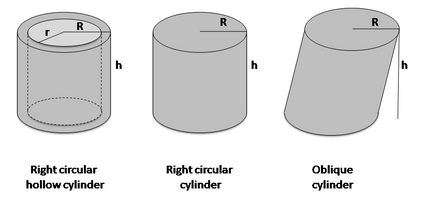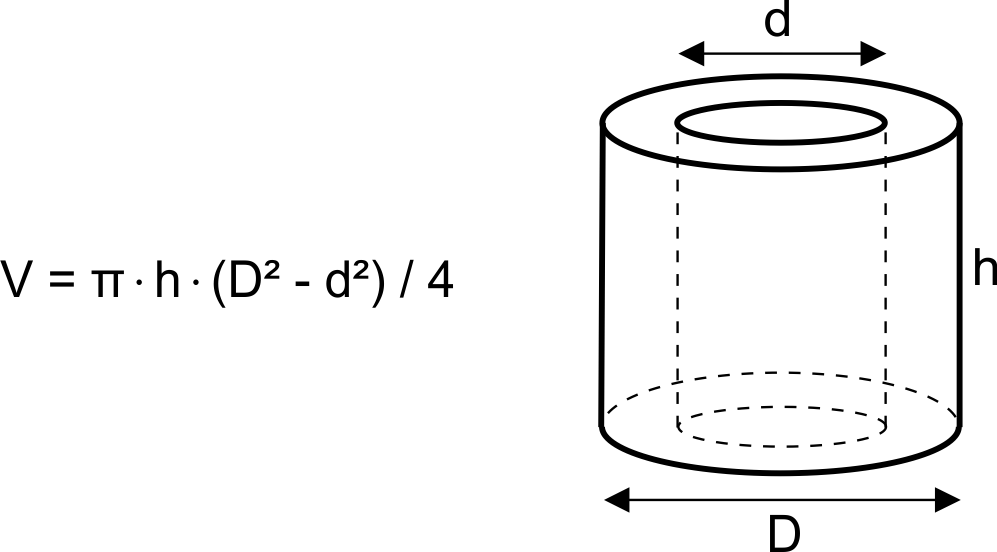How To Get The Volume Of A Cylinder
Cylinder Volume Calculator
Last updated:
Nov 05, 2021
- How to calculate volume of a cylinder?
- Volume of a hollow cylinder
- Volume of an oblique cylinder
- FAQ
Our cylinder volume calculator enables calculating the volume of that solid. Whether you want to figure how much water fits in the can, coffee in your favorite mug, or even what's the volume of a drinking straw - you're in the right place. The other option is calculating the volume of a cylindrical shell (hollow cylinder).
How to calculate volume of a cylinder?
Let's start from the beginning - what is a cylinder? It's a solid bounded by a cylindrical surface and two parallel planes. We can imagine it as a solid physical tin having lids on top and bottom. To calculate its volume, we need to know two parameters - the radius (or diameter) and height:
cylinder_volume = π * cylinder_radius² * cylinder_height
Cylinder volume calculator helps in finding the volume of right, hollow and oblique cylinder:

Volume of a hollow cylinder
The hollow cylinder, also called the cylindrical shell, is a three-dimensional region bounded by two right circular cylinders having the same axis and two parallel annular bases perpendicular to the cylinders' common axis. It's easier to understand that definition imagining e.g. a drinking straw or a pipe - the hollow cylinder is this plastic, metal, or other material part. The formula behind the volume of a hollow cylinder is:
cylinder_volume = π * (R² - r²) * cylinder_height
where R - external radius, and r - internal radius
To calculate the volume of a cylindrical shell, let's take some real-life example, maybe... a roll of toilet paper, because why not? :)
- Enter the external radius of the cylinder. The standard is equal to approximately 5.5 cm.
- Determine the internal cylinder radius. It's the internal radius of the cardboard part, around 2 cm.
- Find out what's the height of the cylinder, for us it's 9 cm.
- Tadaaam! The volume of a hollow cylinder is equal to 742.2 cm3.
Remember that the result is the volume of the paper and the cardboard. If you want to calculate how much plasticine you can put inside the cardboard roll, use the standard formula for the volume of a cylinder - the calculator will calculate it in the blink of an eye!
Volume of an oblique cylinder
The oblique cylinder is the one that 'leans over' - the sides are not perpendicular to the bases in contrast to a standard 'right cylinder'. How to calculate the volume of an oblique cylinder? The formula is the same as for the straight one. Just remember that the height must be perpendicular to the bases.
Now when you know how to calculate a volume of a cylinder, maybe you want to determine the volumes of other 3D solids? Use this volume calculator! If you are curious how many teaspoons or cups fits into your container, use our volume converter. To calculate the volume of soil needed for flower pots of different shapes - also for the cylindrical one - use the potting soil calculator.
FAQ
Where can you find cylinders in nature?
Cylinders are all around us, and we are not just talking about Pringles' cans. Although things in nature are rarely perfect cylinders, they are: tree trunks & plant stems, some bones (and therefore bodies), and the flagella of microscopic organisms. These make up a large amount of the natural objects on Earth!
How do you draw a cylinder?
- Draw a slightly flattened circle. The more flattened it is, the closer you are to looking at the cylinder side on.
- Draw two equal, parallel lines from the far sides of your circle going down.
- Link the ends of the two lines with a semi-circular line that looks the same as the bottom half of your top circle.
- Add shadow and shading as appropriate.
How do you calculate the weight of a cylinder?
- Square the radius of the cylinder.
- Multiply the square radius by pi and the cylinder's height.
- Multiply the volume by the density of the cylinder. The result is the cylinder's weight.
How do you calculate the surface area to volume ratio of a cylinder?
- Find the volume of the cylinder using the formula πr²h.
- Find the surface area of the cylinder using the formula 2πrh + 2πr2 .
- Make a ratio out of the two formulas, i.e. πr2h : 2πrh + 2πr2.
- Alternatively, simplify it to rh : 2(h+r).
- Divide both sides by one of the sides to get the ratio in its simplest form.
How do you find the height of a cylinder?
If you have the volume and radius of the cylinder:
- Make sure the volume and radius are in the same units (e.g. cm3 and cm) and radius in is radians.
- Square the radius.
- Divide the volume by the radius squared and pi to get the height in the same units as the radius.
If you have the surface area and radius (r):
- Make sure the surface and radius are in the same units and radius in is radians.
- Subtract 2πr² from the surface area.
- Divide the result of step 1 by 2πr.
- The result is the height of the cylinder.
How do I find the radius of a cylinder?
If you have the volume and height of the cylinder:
- Make sure the volume and height are in the same units (e.g. cm3 and cm) and radius in is radians.
- Divide the volume by pi and the height.
- Square root the result.
If you have the surface area and height (h):
- Substitute the height, h, and surface area into the equation, surface area = πr2h : 2πrh + 2πr2.
- Divide both sides by 2π.
- Subtract surface area/2π from both sides.
- Solve the resulting quadratic equation.
- The positive root is the radius.
How do you find the volume of a right trapezoidal cylinder?
A right trapezoidal cylinder, also known as a rectangular prism, can be solved as such:
- Add the two parallel sides (bases) of the trapezium together.
- Divide the result by 2.
- Multiply the result of step 2 by the height of the trapezium (i.e., the distance that separates the two sides).
- Multiply the result by the length of the cylinder.
- The result is the area of a right trapezoidal cylinder.
How do you find the volume of an oval cylinder?
- Multiply the smallest radius of oval (minor axis) by its largest radius (major axis).
- Multiply this new number by pi.
- Divide the result of step 2 by 4. The result is the area of the oval.
- Multiply the area of the oval by the height of the cylinder.
- The result is volume of an oval cylinder.
How do you find the volume of a slanted cylinder?
- Find the radius, side length and slant angle of the cylinder.
- Square the radius.
- Multiply the result by pi.
- Take the sin of the angle.
- Multiply the sin by the side length.
- Multiply the result from step 3 and 5 together.
- The result is the slanted volume.
How do you calculate the swept volume of a cylinder?
- Divide the bore diameter by 2 to get the bore radius.
- Square the bore radius.
- Multiply the square radius by pi.
- Multiply the result of step 3 by the length of the stroke. Make sure the units for bore and stroke length are the same.
- The result is the swept volume of one cylinder. Multiply this value by the number of cylinders in the engine to get the engine's total capacity.
Hanna Pamuła , PhD candidate
Right / oblique full cylinder

Hollow cylinder

How To Get The Volume Of A Cylinder
Source: https://www.omnicalculator.com/math/cylinder-volume
Posted by: blackmoningeng.blogspot.com

0 Response to "How To Get The Volume Of A Cylinder"
Post a Comment